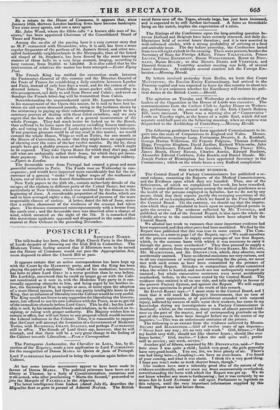THE FACTORY EVIDENCE.
The Central Board of Factory Commissioners has published a se- cond volume, containing the Reports of the Medical Commissioners, and the Evidence upon which they are founded. Thus, one of the deficiencies, of which we complained last week, has been remedied. There is some difference of opinion among the medical gentlemen as to the health of the persons employed in factories, but we do not by any means think that their reports justify. the sweeping assertions of the bad effects of such employment,. which we found in the First Report of the Central Board. On the contrary, we should say that the impres- sion which they are calculated to leave upon an unprejudiced person is quite the reverse. The evidence collected by Mr. TUFFNELL, and published at the end of the Second Report, is also upon the whole de- cidedly adverse to the conclusions which have been adopted by the Central Board.
We alluded last week to rumours that some important evidence bad been suppressed, and that other parts had been mutilated. We find by the Report now published that this was true to some extent. The Com- missioners, in a note to page 1 of the Report, say—" We avail ourselves of the present occasion to supply some passages of our first Report, which, in the extreme haste with which it was necessary to carry it through the press, were overlooked." They then proceed to supply a number of extracts from the reports of Sir DAVID BARRY, Mr. STUART, Mr. MACKINTOSH, and Mr. DRINKWATER, which, they observe, were accidentally omitted. These accidental omissions are very curious, and in all our experience of writing and correcting for the press, we never met with such errors as have been committed by the printers of this Factory Report. Mistakes in composition are often committed when the writer is hurried, and words are not unfrequently misspelt or omitted ; but whole consecutive sentences were never accidentally overlooked, before, in the niaaner stated by the Central Board. The evidence thus omitted is all on one side, and tells mightily in favour of the present Factory System, and against the Report. We will supply one or two specimens in proof of the truth of this remark. Sir DAVID BARRY says—" I must state to the Central Board, and I trust that it will reach his Majesty's Government, that no case of cruelty, gross oppression, or of punishment attended with corporal injury, inflicted by owners of mills upon their workers, has come to my knowledge during my investigations as a Factory Commissioner in Scotland ; whilst, on the contrary, many traits of almost parental kind- ness on the part of the master, and of corresponding gratitude on the part of the servant, have been brought before me in the course of my inquiries."—This was an unfortunate omission of the printer. The following is an extract from the evidence collected by Messrs. STUART and MACKINTOSH.—Girl of twelve years of age deposes-
" Never hurt any way; it's no very sair work." Girl, fifteen—" Had my health very well ; should not like shorter hours ; should like over hours better." Girl, twelve—" Likes the mill quite well ; prefer mill to service ; sair work, service."
Another girl of fifteen, examined by Mr. DRINKWATER, said—" Been here since I was quite a child ; health very good ; the girls generally have verygood health. You see, Sir, we have plenty of air. There's one bad thing here—(Laughing)—we have no over-hours. I've beard of your coming, and what it was about. I think it's a very good thing. I hope you won't make us work shorter hours, tkough."
Our readers have now a tolerably good idea of the nature of the
evidence accidentally, and we must say most unaccountably overlooked, notwithstanding the haste with which the Report was got up. We do not know whether any more is forthcoming ; but it was certainly by no means fair in Lord ALTHORP to call upon Parliament to legislate on this subject, until the very important information supplied by this Second Report was laid before them.




















 Previous page
Previous page